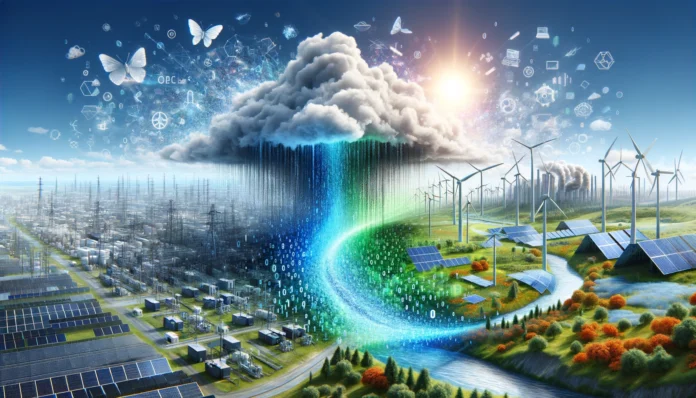In today’s rapidly evolving world, the conversation around sustainable energy solutions has become increasingly urgent. As nations strive to meet ambitious carbon reduction targets and mitigate the impacts of climate change, the integration of advanced technologies has emerged as a crucial component of this endeavour. Among these technologies, artificial intelligence (AI) stands out as a powerful tool with the potential to revolutionize the energy sector.
AI is fundamentally about using data to drive informed decision-making and process optimisation. When applied to sustainable energy, AI has the potential to unleash new efficiencies, improve grid resilience, and accelerate the transition to renewables. One of the most important areas where AI is having a substantial impact is energy production and distribution optimisation.
AI algorithms can accurately estimate energy demand by analysing massive volumes of data collected from sensors, smart metres, and other IoT devices. This enables utility companies to alter generating levels in real-time, making the most use of renewable resources like solar and wind power while reducing dependency on fossil fuels.
Furthermore, AI-driven predictive maintenance techniques help identify potential equipment failures before they occur, reducing downtime and optimizing the performance of renewable energy infrastructure. This proactive approach not only improves operational efficiency but also extends the lifespan of assets, ultimately leading to cost savings and lower carbon emissions.
AI is also pushing innovation in sustainable energy solutions through the development of smart grids. These digitally connected networks use AI algorithms to balance supply and demand in real-time, allowing for more efficient energy transmission and distribution. Smart grids play an important role in maximising the use of clean energy resources while minimising waste by integrating renewable energy sources at scale and dynamically controlling energy flows.
Moreover, AI-powered energy management systems empower consumers to take control of their energy usage and reduce their carbon footprint. By analyzing historical consumption patterns and environmental factors, these systems provide personalized recommendations for optimizing energy efficiency and reducing energy costs. From smart thermostats that adjust temperature settings based on occupancy patterns to intelligent lighting systems that automatically dim lights in empty rooms, AI-enabled devices help individuals and businesses alike embrace sustainable practices.
Beyond optimizing energy production and consumption, AI is also driving innovation in energy storage technologies. As the deployment of intermittent renewable energy sources such as solar and wind continues to grow, the need for reliable energy storage solutions becomes increasingly critical. AI algorithms play a crucial role in optimizing the performance of energy storage systems, improving efficiency, and extending battery life.
In addition to increasing the efficiency of existing energy infrastructure, artificial intelligence is pushing innovation in the development of next-generation renewable energy solutions. From sophisticated materials science to autonomous energy systems, researchers are using artificial intelligence to push the boundaries of sustainable energy generation. Whether it’s using artificial photosynthesis to manufacture renewable fuels or creating unique solar panel combinations for optimal efficiency, AI is speeding innovation in the search for cleaner, greener energy sources.
The use of AI in the energy sector, in summary, signifies a revolutionary change towards a future that is more robust and sustainable. Artificial Intelligence (AI) promotes more efficient energy production, distribution, and consumption by utilising the capabilities of data analytics, machine learning, and predictive modelling. Artificial intelligence plays a crucial part in sustainable energy solutions, ranging from revolutionising energy storage technology to optimising renewable energy supplies. We are getting closer to realising our shared objective of decarbonising the energy industry and preserving the environment for coming generations as we keep utilising AI-driven innovation.





